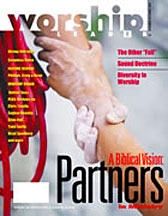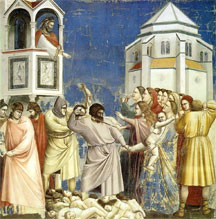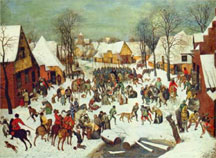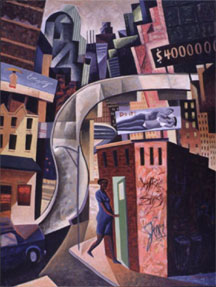| |
A Resource by Mark D. Roberts |
|
Euthanasia in the Netherlands
by Rev. Dr. Mark D. Roberts
Copyright © 2004 by Mark D. Roberts
Note: You may download this resource at no cost, for personal use or for use in a Christian ministry, as long as you are not publishing it for sale. All I ask is that you give credit where credit is due. For all other uses, please contact me at mark@markdroberts.com . Thank you.
A Shocking Story: Euthanasia of Children in the Netherlands
Part 1 in the series "Euthanasia in the Netherlands"
Posted at 5:55 p.m. on Tuesday, November 30, 2004
I'm currently in the studio of Hugh Hewitt doing a radio interview on a shocking story from the Netherlands. In a hospital there, doctors have been euthanizing children who are struggling with serious illness. The implications of this practice are truly chilling. Increasingly, we who value the sanctity of each human life will be called upon to defend our belief in the face of pervasive moral relativism.
An additional note: One of the callers to Hugh's show raised an objection to the position that Hugh, David Allen White, and I were taking in opposition to the euthanizing of children. His objection went something like this: "You folks are always so concerned about the sanctity of life. But what about the quality of life? Isn't it time we tried to preserve the quality of human life, and not just the quantity?"
I have heard this "quality of life" objection frequently thrown in the faces of pro-lifers. "You people care so much about keeping fetuses alive," it is claimed, "but you neglect the quality of life for the babies that are born. Shouldn't you folks care more about issues of poverty, justice for the poor, and so forth, if you're going to be pro-life?"
Let me say that sometimes this objection is well-founded. There are some pro-lifers who seem to care only about the birth of the baby, not about what the baby will experience once he or she is born. At least this is what their rhetoric reveals. But, in my experience, most pro-lifers are also concerned for the quality of life for the baby and the mother. As indeed they should be.
But I want to address the caller's objection a bit more philosophically.
First, the "sanctity of life vs. quality of life" issue is often posed as an either/or: either you care about the sanctity of life, or you care about the quality of life, but not both. This is a logical error. One can, and I would argue that one should, care about both. It's not a question of one or the other.
Moreover, I would contend that a concern for someone's quality of life is ultimately dependent upon a commitment to the sanctity of that person's life. If you believe that each human being has value, then you'll care about what that human being experiences in life. But if you devalue human life, if it's merely an accident of evolutionary processes, if it's something that can be terminated by the will of the powerful, then why should you care about the quality of life experienced by some human being for whom you have no particular feelings? For example, like many Christians in America, I am deeply concerned about what's happening with millions of AIDS orphans in Africa. But I am so concerned precisely because I believe that each child is sacred, that each life is a gift of God. If I abandoned my commitment to the sanctity of life, then, in the end, why should I care what happens to people who live far away from me, whom I will never personally encounter? So, it seems clear to me that a concern for the quality of a person's life depends, to a great extent, on a commitment to the sanctity of that person's life.
One final comment. Pro-lifers are often criticized for failing to care about the quality of life of the babies who are born into poverty or other difficult situations. Whether or not this is a fair criticism, it seems to me that the critics haven't exactly shown much concern for the poor either. In the last election, I heard a lot about protecting a woman's right to choose from candidates on the left, but I heard very little about the need to improve the condition of the poor, in this country or in other countries. Caring for and empowering the poor may not be a hot political issue, but it is one that all persons of conscience -- and Christians in particular -- should hold close to their hearts.
Home
Euthanizing Children in the Netherlands: Some Insightful Links
Posted at 3:55 and 8:05 p.m. on Wednesday, December 1, 2004
Here are some helpful links I found concerning the recent revelation that Dutch doctors have been putting infants to death if the infants are suffering from incurable disease:
An in-depth overview of the issue
An outstanding analysis by an ethicist with the Vatican
An interview with a leading Catholic bioethicist
An opinion column by Charles Colson
An incisive article from the Weekly Standard by the leading ethicist Wesley J. Smith
A story on outrage among Christians
Also, the blogosphere is producing some worthwhile commentary:
A moving e-mail sent to and posted by Hugh Hewitt
A blogger who shows that you don't have to be religious or pro-life to be horrified by what's happening in the Netherlands.
Two other interesting pieces by Mark Sides and John Mark Reynolds.
As horrifying as this story is to many of us, it presents us with a timely opportunity. The Dutch doctors have thrown down the gauntlet. It's our turn to make the case for the sanctity of human life, even as we show clearly where the path of moral relativism takes us.
Home |
|
| |
Notice carefully the nature of the gauntlet thrown to us by the Dutch doctors. Look familiar? |
Euthanizing Children and the Christmas Story
Part 3 in the series “Euthanasia in the Netherlands”
Posted at 9:30 p.m. on Wednesday, December 1, 2004
First of all, let me apologize to readers who were expecting me to continue my series “Advent and the Christian Year” today as I had promised. I will get back to this series soon, tomorrow, I think. But what I would have written today will be more or less the same tomorrow. The pressing issue of the euthanasia of children in the Netherlands deserves immediate attention.
Yet, in this post I want to make a seasonal connection, because what’s happening in the Netherlands today actually does relate to what happened in Judea two millennia ago.
For one thing , in the Christmas story we have an instance of the killing of children when they are inconvenient. I’m speaking, of course, of Herod’s infamous slaughter of the innocents in Matthew 2:1-18. Herod the Great, threatened by the birth of one whom the Magi identified as a king, had all the male infants in Bethlehem killed, just to make sure none of them replaced him and his heirs on the throne of Judea. If this seems unlikely, remember that Herod also had his own wife executed to insure his political advantage (Josephus, Antiquities 15.7.4).
Is this relevant to the situation in the Netherlands? Not, of course, on the most obvious level. The doctors who terminated the lives of babies weren’t doing so to insure their political advantage, but because they sought to relieve suffering. But the precedent this sets, where a person in power gets to decide whether an innocent infant lives or dies, can easily lead in the direction of Herod’s slaughter. If you don’t believe me, remember Nazi Germany, or Pol Pot in Cambodia, or the situation right now in the Sudan. King Herod stands as a seasonal warning of what can happen when the powerful decide to take the lives of the weak.
Yet the Christmas story also speaks to the situation in the Netherlands in an altogether different way. What Christians celebrate at Christmas is the entry of God into the world in order to save the world from its sinfulness. Vivid reminders of human depravity, such as we see in the Netherlands, remind us powerfully of our need for a Savior. Surely our moral confusion and sinfulness may not be as egregious as that of the Dutch doctors, but, in the end, we need God’s salvation just as much as they do. Thus the chilling headlines about euthanasia in the Netherlands can prepare for the good news of Christmas.
Moreover, in this season we remember that God entered into human history, not as a superman flying to earth on a fiery chariot, but as a helpless, vulnerable baby. Not only was this point of entry necessary for salvation, but also it underscored the sanctity of human life, beginning with infancy.
The story of the Groningen Protocol stands in stark contrast to the story of Christmas. In the one, human life isn’t sacred; in the other, human life is so valuable that God becomes human in order to save humanity. In the Dutch story, babies who can’t determine their own fate are sacrificed; in the Christmas story, the God of Universe becomes a helpless baby, the powerful taking on powerlessness. Yet, in the end, that baby will grow up and choose to sacrifice himself for the sake of humankind . . . even little babies, even Dutch doctors. The good news of Christmas is that no human life is beyond the reach of God’s gracious salvation. |
|
| |
"The Slaughter of the Innocents" by Giotto (c. 1305) In each generation, artists have pictured the classic story in contemporary terms, a reminder of our own tendency to repeat the tragic actions of history.
|
|
| |
By Pieter Bruegel c. 1565
|
|
| |
|
In this season of the year we remember the prophecy of Isaiah: “The people who walked in darkness have seen a great light; those who lived in a land of deep darkness – on them the light has shined” (9:2). What’s happening in the Netherlands today reminds us of the darkness in which we walk when we live apart from God and God’s truth. But what is the Lord’s way of shining his light into our darkness? Isaiah continues, “For a child has been born for us, a son given to us; authority rests upon his shoulders; and he is named Wonderful Counselor, Mighty God, Everlasting Father, Prince of Peace” (9:6). Through a child, the infant Jesus, God shines his light into our darkness. If ever we needed divine light, surely we need it today.
Home
|







